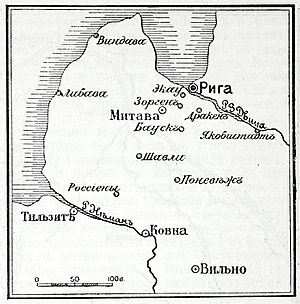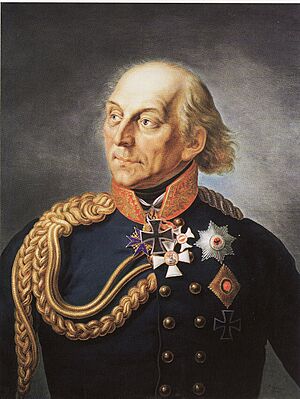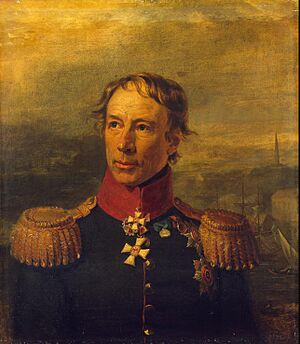Battle of Mesoten facts for kids
Quick facts for kids Battle of Mesothen |
|||||||
|---|---|---|---|---|---|---|---|
| Part of the French invasion of Russia | |||||||
 Theater of military operations |
|||||||
|
|||||||
| Belligerents | |||||||
| Commanders and leaders | |||||||
| Strength | |||||||
| 22,000 | 16,000 | ||||||
| Casualties and losses | |||||||
| 4,000 | 1,250 | ||||||
The Battle of Mesothen was a fight that happened from September 26 to October 1, 1812. It was part of the bigger French invasion of Russia. This battle took place near the town of Mežotne (which was called Mesothen back then) in what is now Latvia. The main groups fighting were the Russian army and the Prussian army, who were helping the French at the time.
Why the Battle Happened
In September 1812, Russian troops led by General Fabian Steinheil moved into several towns like Mitau without a fight. However, these Russian troops were spread out. This made them easy targets for enemy counterattacks. The Prussian army decided to protect their cannons and supplies at the Bauska Castle. They also sent small groups of soldiers to guard the river crossing at Lielupe.
The Fight Begins
On September 29, the Prussian forces launched a surprise attack. They moved against the Russian soldiers who were advancing. The battle started around 5 PM and continued late into the night. The Prussians managed to push the Russian troops back.
That same night, the Prussian commander, Ludwig von Yorck, sent more soldiers. These troops, led by Friedrich Kleist, attacked the Russian soldiers who were chasing a small Prussian group. This part of the battle happened in the dark. Only foot soldiers were involved. The Prussians had many more soldiers than the Russians. They forced the Russian troops to retreat. After getting even more soldiers, the Prussians went on the attack.
What Happened After
Because of this battle, General Steinheil stopped his army's advance. He led his troops back to Riga. Even though it was a defeat for the Russians, this battle helped another Russian army. It took some pressure off the army led by Peter Wittgenstein. This allowed Wittgenstein's army to capture the city of Polotsk later, on October 20.
See also
 | Delilah Pierce |
 | Gordon Parks |
 | Augusta Savage |
 | Charles Ethan Porter |



